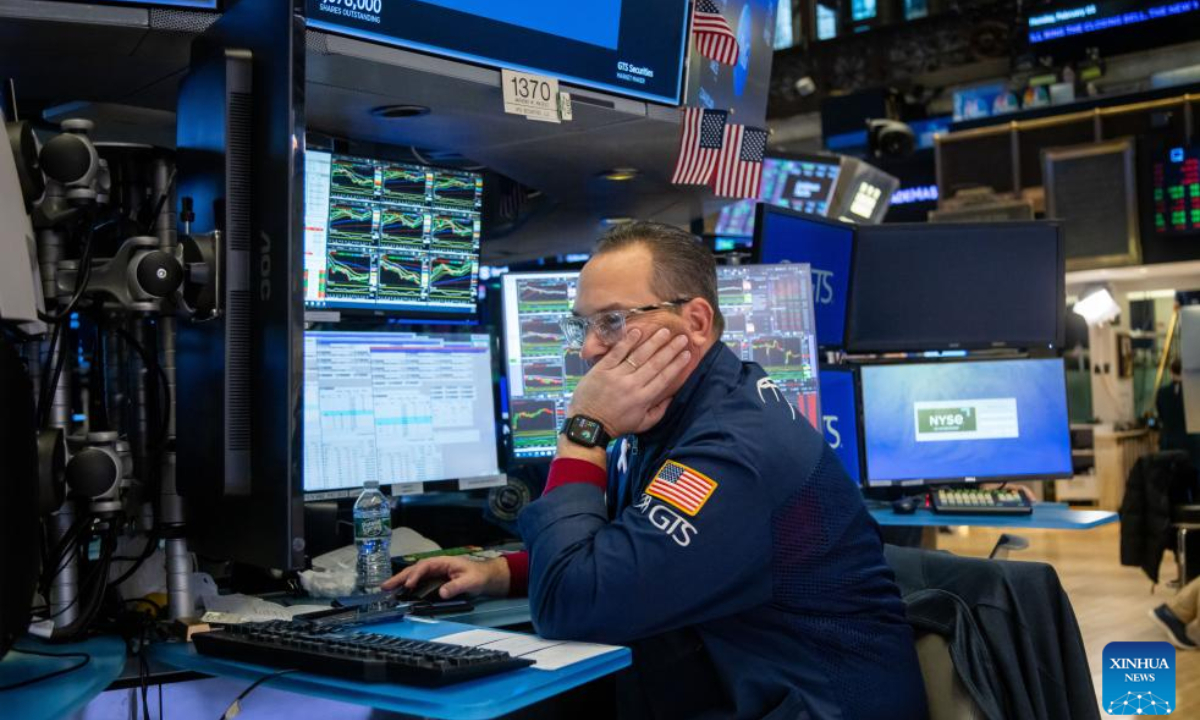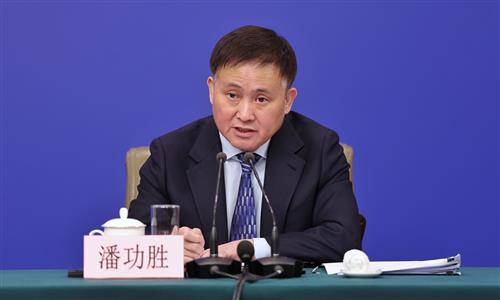US' mixed messages on China trade talks 'misleading'
Sincerity is needed for negotiations, not coercion or confusing signals: expert

A trader works on the floor of the New York Stock Exchange in New York, the United States, on Feb. 3, 2025. U.S. stocks ended lower on Monday, as investors reacted to the Donald Trump administration's planned tariff rollout. The Dow Jones Industrial Average fell 122.75 points, or 0.28 percent, to 44,421.91. The S&P 500 sank 45.96 points, or 0.76 percent, to 5,994.57. The Nasdaq Composite Index shed 235.49 points, or 1.20 percent, to 19,391.96. (Photo by Michael Nagle/Xinhua)
Chinese embassy in the US has said that there have been no consultations or negotiations between China and the US on tariffs, calling the related statements from the US misleading, and warned the US who provoked the tariff war that "whoever caused the knot should be the one to untie it."
This is another reiteration from the Chinese side, following similar statements made earlier this week by the Chinese foreign ministry and commerce ministry in response to the Trump administration's claims that the two sides have held trade discussions.
The mixed and chaotic signals released by the US side suggest it is attempting to issue an empty promise of "stability" to domestic markets, while also highlighting a strong desire to reach an "easy" agreement with China, a Chinese expert said. However, under these unilateral protectionist measures initiated by the US, genuine negotiations require mutual respect, equality, and sincerity, not coercion or being misleading, which will only backfire, the expert said.
Responding to a media comment that the US has repeatedly expressed willingness to reach an agreement with China on the issue of tariffs and claimed that the two sides have held discussions, a spokesperson of the Chinese Embassy in the US said on Friday that such statements are misleading.
"As far as I know, there have been no consultations or negotiations between China and the US on the issue of tariffs, let alone any agreement being reached," the spokesperson said, noting that the tariff war was unilaterally provoked by the US, and "whoever caused the knot should be the one to untie it."
If the US genuinely seeks to resolve the issue through dialogue and negotiation, it must correct mistakes, abandon coercive tactics and remove all unilateral tariff measures against China, the spokesperson said, noting that meaningful dialogue can only take place on the basis of equality, mutual respect and mutual benefit.
Mutual respect, peaceful coexistence, and win-win cooperation are the right way for China and the US to get along in the new era, said the embassy spokesperson, adding that one cannot expect to work with China by speaking of cooperation on the one hand and exerting maximum pressure on the other.
US President Donald Trump asserted in an interview published on Friday that tariff negotiations were under way with China, Reuters reported.
He told TIME magazine that talks were taking place, an assertion he repeated to reporters as he was leaving the White House on Friday morning for Rome to attend the funeral of Pope Francis, the report said.
A White House official said lower level in-person talks as well as a phone call between US and Chinese staff had taken place this week, Reuters said in a separate report on Thursday.
The claim that China and the US have held trade talks has been repeatedly made by the US side, despite both the Chinese Foreign Ministry and Commerce Ministry having denied that any negotiations have taken place.
Foreign Ministry spokesman Guo Jiakun reiterated on Friday that China and the US are not having any consultation or negotiation on tariffs. "The US should stop creating confusion," he said.
The release of false and mixed signals about negotiations appears to be aimed more at projecting a sense of "stability" to the US domestic audience and financial markets, in addition to the fact that it is eager to reach an "easy" deal with China, Bao Jianyun, dean and professor of the Department of International Politics, School of International studies at Renmin University of China, told the Global Times on Saturday.
However, in the tariff war launched by the US, the Trump administration has, in fact, failed in this round of the standoff, as its approach was flawed, ran counter to economic principles, and not only failed to achieve its original goal of revitalizing the US economy but actually produced the opposite effect, Bao said.
In private, some Trump officials concede that they did not accurately predict China's reaction, the New York Times reported on Wednesday, noting that the US president "seemed to expect China to be among the first to come begging for relief, given the size of its exports to the US."
"But they have been preparing for further escalation for many years," Nicholas Mulder, an economic historian at Cornell University said. Now, "they have much more tolerance for economic pain, and a greater ability to weather this ratcheting up," according to the New York Times.
Rules-based system undermined
However, the mixed and confusing messages from the US have continued. While speaking to reporters aboard Air Force One on Friday, Trump claimed that he would not drop tariffs on China, the world's second largest economy, unless Beijing offers "something substantial" in return, Bloomberg reported on Friday
Pressed on what concessions he'd like to see from Beijing, the US president claimed that he would like China to open its economy - but that he believed it was a non-starter so was not sure he would pursue it as part of the tariff talks, the report said.
Commenting on the latest remarks, Zhou Mi, a senior research fellow at the Chinese Academy of International Trade and Economic Cooperation, told the Global Times on Saturday that "I believe the condition the US administration proposed is inherently very unclear, as China has been continuously opening up to the world, while it is the US that is launching protectionist moves by not opening itself up to global products."
"This may also be part of the US administration's strategy — to release all kinds of smoke screens to confuse others including US businesses and consumers. However, it is clear that this approach cannot achieve its intended goals, but merely adds confusion to the market itself," Zhou said, adding that the world market is still digesting the mixed signals from the US administration, with investors waiting to see what will happen next in this US-created tariff war.
While most stock indexes climbed on Friday and the dollar had its first-ever weekly rise in over a month as investors searched for signs that the US-China trade war may be easing, investors have been listening closely to corporate calls this earnings season, particularly for lowered or pulled projections, amid uncertainty surrounding the US tariff offensive, Reuters reported on Saturday.
Speaking at the 51st meeting of the International Monetary and Financial Committee (IMFC) of the International Monetary Fund (IMF), Pan Gongsheng, Governor of the People's Bank of China, the central bank, said that the US' recent arbitrary imposition of tariffs has seriously infringed upon the legitimate rights and interests of other countries and severely undermined the rules-based multilateral governance system, according to a statement published on the central bank's website on Saturday.
The meeting was held on Thursday and Friday in Washington, DC, where participants discussed global economic and financial conditions as well as the IMF's ongoing work. During the speech, Pan noted that the current momentum for global economic growth remains weak, with significant downside risks.
The impact of the US tariff policy is also being felt by US businesses. For example, according to Wall Street Journal on Friday, Apollo's chief economist warned that there could be "empty shelves in US stores in a few weeks and Covid-like shortages for consumers and for firms."
Inflation will soon pick up, given China is the main provider to the US of numerous goods, Apollo's Torsten Slok added in a daily note, the report said.
Amid the market complexity, increasingly more observers believe that the US administration failed to make the right judgment in handling trade with China. Sean Stein, president of the US-China Business Council, said at an event hosted by the US-China Education Trust on Thursday that Washington might have less leverage in tariff negotiations with Beijing than it thinks, the South China Morning Post reported.
'Sincerity is needed'
After the US imposed additional tariffs on China, its domestic financial markets — including the stock market, currency market, and bond market — experienced varying degrees of volatility. Bao said that facing turbulence in the financial markets and opposition and concerns from various sectors, including retail giant Walmart, the Trump administration came under increasing pressure.
Bao said that although the Trump administration has sent out signals of "softening," in reality, it has only changed its negotiation tactics, and the goal of suppressing China remains unchanged.
In the ongoing tariff war with China, the US administration's fundamental position has not shifted, nor has it abandoned its goal of containing China, Bao said, noting that "we must remain vigilant. China, along with other countries affected by the tariffs, should be fully prepared."
At the same time, Zhou said that if genuine negotiations are to take place, the most basic requirement is sincerity, not sending misleading signals as is happening now, because ultimately, such actions only deceive itself.



